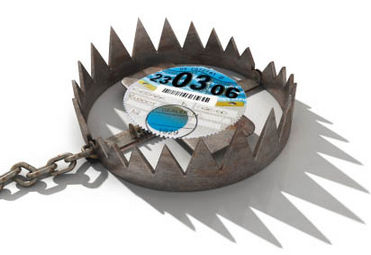Consumer
Alert  Taxpayers
Beware
The IRS warns taxpayers to be on the alert for e-mails and phone calls they may receive which claim to come from the IRS or other federal agency and which mention their tax refund or economic stimulus payment. These are almost certainly a scam whose purpose is to obtain personal and financial information — such as name, Social Security number, bank account and credit card or even PIN numbers — from taxpayers which can be used by the scammers to commit identity theft. The e-mails and calls usually state that the IRS needs the information to process a refund or stimulus payment or deposit it into the taxpayer's bank account. The e-mails often contain links or attachments to what appears to be the IRS Web site or an IRS "refund application form." However genuine in appearance, these phonies are designed to elicit the information the scammers are looking for.
The IRS does not send taxpayers e-mails about their tax accounts. Additionally, the way to get a tax refund or stimulus payment, or to arrange for a direct deposit, is to file a tax return.
 Tips
for Choosing a Tax Preparer In
the End, YOU are Responsible
If you pay someone to prepare your tax return, choose that preparer wisely. Taxpayers are legally responsible for what’s on their own tax returns even if prepared by someone else. So, it is important to choose carefully when hiring an individual or firm to prepare personal returns. Most return preparers are professional, honest and provide excellent service to their clients. Here are a few points to keep in mind when someone else prepares your return:
- A Paid Preparer is required by law to sign the return and fill in the preparer areas of the form. The preparer should also include their appropriate identifying number on the return. Although the Preparer signs the return, you are responsible for the accuracy of every item on your return. In addition, the preparer must give you a copy of the return.
- Review the completed return to ensure all tax information, your name, address and Social Security number(s) are correct. Make sure that none of these spaces is left blank.
- Review and ensure you understand the entries and are comfortable with the accuracy of the return before you sign.
- Never sign a blank return, and never sign in pencil.
- If you have provided specific authorization in a power of attorney filed with the IRS, you may have copies of notices or refund checks mailed to your preparer or representative; but only you can sign and cash your refund check.
- A Third Party Authorization Check Box on Form 1040 allows you to designate your Paid Preparer to speak to the IRS concerning how your return was prepared, payment and refund issues and mathematical errors.
Articles reprinted
courtesy of US Internal Revenue Service
|
 |
|
JANUARY
2010
|
|




|
 |
| About
Tax Legend |
|
TaxLegend201 is an affiliate of Drake Software, used by more than 30,000 tax professionals each year. With our service, you are assured of a competent, cost-effective analysis. Our goal is to not only save you money, but help you keep your money!
TaxLegend201 offers convenient and cost-effective tax preparation services. Take advantage of our conversion services for most 1040 tax programs, including Intellitax™ (both DOS and Windows), Lacerte®, ProSeries®, MAX®, TaxWise®, TaxWorks®, UltraTax®, TaxSlayer Pro®, Crosslink®, ProSystem FX®, TaxSimple®, GreatTax™ and TaxAct®. We also provide data conversion software for MAX®, ProSystem FX®, TaxWorks®, GreatTax™, TaxWise®, UltraTax®, Lacerte® and ProSeries®' 1065, 1120 and 1120S programs.
If you need a tax preparation software program that stands out from the rest, look no further than TaxLegend201. Our software is backed by an experienced team of programmers, tax analysts, CPAs and EAs. It's easy to understand why thousands of preparers trust it year after year.
|
 |
 |
 |
| The Truth about Frivolous Tax Arguments |
The Truth About Frivolous Tax Arguments
( PDF
405K) addresses some of the more common false "legal" arguments made by individuals and groups who oppose compliance with the federal tax laws. These arguments are grouped under six general categories, with variations within each category.
Each contention is briefly explained, followed by a discussion of the legal authority that rejects the contention. The second section deals with frivolous arguments encountered in collection due process cases. The final section illustrates penalties imposed on those pursuing frivolous
cases.
|
 |
|